Scissor Sisters' Scott Hoffman reveals the comics that inspired his new cyberpunk series, Nostalgia
The new Comixology Originals title is drawn by Danijel Žeželj
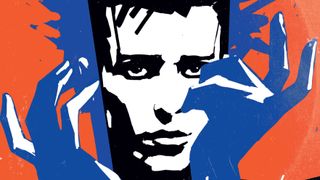
Multi-instrumentalist Scott Hoffman - AKA Babydaddy - has been crafting pop hits with his band Scissor Sisters for more than 20 years now. Outside of music, Hoffman is also a comics fan and a writer. He combines these two passions with his new Comixology Originals series, Nostalgia, which launched last week.
The series, which is drawn by artist Danijel Žeželj, follows Craig Mancini, a reclusive rock superstar living in a dystopian future world. He's given up on the music and mostly stays inside his luxury penthouse. He's drawn into a mystery, however, when he receives a strange package from a fan.
Nostalgia was inspired, in part, by '90s and '00s era comics, notably various Vertigo titles, Sin City, and a classic Judge Dredd tale. Here, Hoffman exclusively breaks down for us the comics that directly had an impact on Nostalgia and which led to him to create this atmospheric and strange new series.
Judge Dredd: America
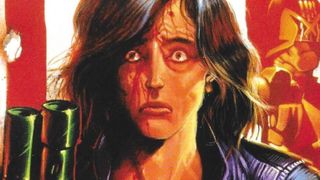
This story, first published in the Judge Dredd Megazine in 1990, is regularly named by fans as the best Dredd story ever.
"I love this strange, ahead-of-its-time story for so many reasons," says Hoffman. "I love the mood, set in the world of Judge Dredd but leaving the titular character mostly on the back burner. I love the leaps in time and narrative trickery that take a minute to get your head around. Most of all I love the emotional desperation. It's a book about living under oppression, about doing anything to survive, about heartache and betrayal. John Wagner is a genius, and the art, by Colin MacNeil, is stunning and painterly."
Mister X
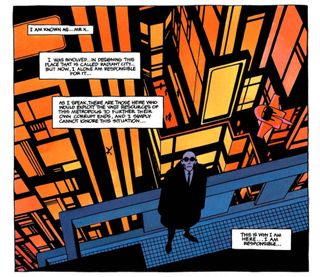
This strange science fiction series was recently reissued by Dark Horse.
"It's a moody, atmospheric noir set in a strange, dystopian metropolis, created by Dean Motter with art by the Hernandez Bros. (switching to others later in the run)," explains Hoffman. "Mister X hits on themes of paranoia, dreams and psychogeography, subjects I had already been thinking about as I wrote Nostalgia. A very short, dreamy sequence, gorgeously rendered by Dave McKean and printed first in the anthology, became an obsession for me in the later stages of writing."
Comic deals, prizes and latest news
Get the best comic news, insights, opinions, analysis and more!
Transmetropolitan
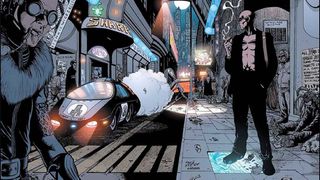
Warren Ellis and Darick Robertson's cyberpunk saga ran for 60 issues, starting in 1997. Hoffman is a firm fan.
"Revisiting Transmetropolitan was a great reminder that visions of the future can be playful AND devastating. The shifts into satire are a strength, not a weakness, of Ellis’ often cartoonish view of the social and cultural landscape of the future. I love how the series plays with '90s sci-fi tropes de rigueur like cyberpunk and body augmentation, and the way those fads really irk an older, washed-up has-been."
Shade, The Changing Man
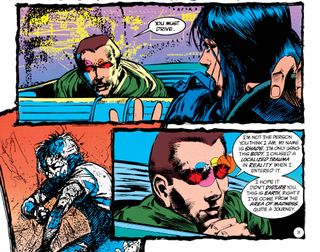
Peter Milligan and Chris Bachalo reinvented this lesser-known Steve Ditko creation into one of the original DC Vertigo comics.
"I admittedly hadn't read this series until a few years ago when I started looking for missed gems from my favorite comics era," says Hoffman. "Shade was recommended by friends who are way savvier than I. I read it all, savored it, got goosebumps, and studied it like a textbook. It served as a great reminder of what I love most in the comics medium: beautiful language, intimate inner voices, and big, mind-bending ideas. I will be re-reading this series endlessly."
Heavy Liquid
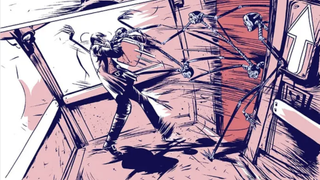
Paul Pope both wrote and drew this memorable cyberpunk series from the turn of the millennium.
"I love the kind of future that Paul Pope builds in Heavy Liquid. Familiar, but just advanced enough to be slightly alien. I thought about this book a lot when writing Nostalgia, especially that feeling of youthful nihilism. Great science fiction seems to always come back to the idea that while kids, no matter what the era, will always find their way to trouble, heartache and rebellion, they'll also use whatever means they have to forge their own identities and place in that world."
Sin City
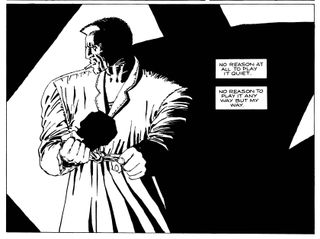
Frank Miller's iconic Sin City takes the last spot on Hoffman's list.
"I have a soft spot for noir, and it's pretty clear that Frank Miller does too. It's palpable in his affinity for Batman, but he seems to have indulged his impulses most with Sin City. It's beautiful, hardcore and poignant, but what I love even more than all of that is the language. Noir really connects to me because it's so narrative, and the inner-voices guiding us through Sin City are so brilliantly realized. Every hard-shelled anti-hero in the series has a soft inner-shell of pathos and self-deprecation that I can relate to."
Nostalgia #1 is out now and is free to read for subscribers of Comixology Unlimited, Kindle Unlimited and Prime Reading. You can also buy issues of the series separately.
Discover the comics that inspired Miles Gunter's Grammaton Punch.

Will Salmon is the Comics Editor for GamesRadar/Newsarama. He has been writing about comics, film, TV, and music for more than 15 years, which is quite a long time if you stop and think about it. At Future he has previously launched scary movie magazine Horrorville, relaunched Comic Heroes, and has written for every issue of SFX magazine for over a decade. He sometimes feels very old, like Guy Pearce in Prometheus. His music writing has appeared in The Quietus, MOJO, Electronic Sound, Clash, and loads of other places and he runs the micro-label Modern Aviation, which puts out experimental music on cassette tape.
Most Popular



